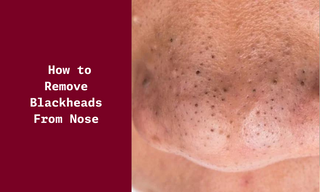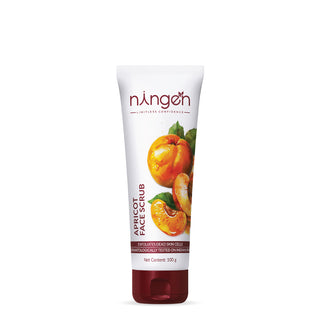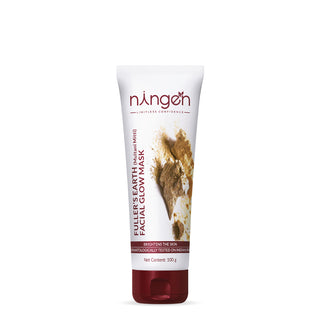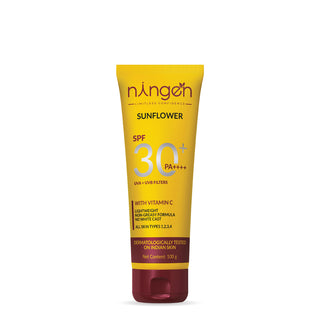Welcome to our guide on removing blackheads from your nose!
Blackheads, small bumps that appear on the skin due to clogged hair follicles, are a common concern for many. In this blog, we'll explore simple and effective methods to eliminate blackheads and achieve clearer, smoother skin on your nose. From gentle skincare routines to tried-and-tested remedies, we'll cover everything you need to know how to remove blackheads from nose.
Let's dive in!
In This Article;
- What Are Blackheads?
- What Causes Blackheads On Nose?
- How to Remove Blackheads From Nose?
- Ingredients to Remove Blackheads From Nose
- Do's and Don'ts to Remove Blackheads on Nose
- What Happens When Blackheads Are Not Removed?
- How To Remove Blackheads On Your Nose At Home?
- Bottom Line
- TL;DR(Too Long; Didn't Read)
- Frequently Asked Questions (FAQ)
What Are Blackheads?
Blackheads are a common skin issue that many people face, especially during adolescence and early adulthood. They are small, dark bumps that are known as open comedones, and appear on the skin, usually on the face, neck, chest, back, and shoulders. Blackheads are a type of acne, caused by clogged pores.
When the pores become clogged with oil, dead cells, and bacteria, a blackhead forms. The top of the clogged pore remains open, and the oxygen in the air causes it to oxidize and turn black, giving it its characteristic appearance.
What Causes Blackheads On Nose?
Blackheads on the nose are caused by the accumulation of dead skin cells, oil, and bacteria within hair follicles or pores. When these substances mix and oxidize with the air, they turn dark, leading to the characteristic appearance of blackheads.
The primary factors contributing to the formation of blackheads include:
- Excess Sebum Production: Overproduction of sebum, the skin's natural oil, can contribute to clogged pores and blackhead formation.
- Dead Skin Cells: The shedding of dead cells can mix with sebum, creating a plug that clogs pores and forms blackheads.
- Bacteria: Bacteria on the skin can interact with the trapped sebum and dead skin , leading to inflammation and blackhead development.
- Hormonal Changes: Hormonal fluctuations, especially during puberty, menstruation, or pregnancy, can increase sebum production and contribute to blackhead formation.
- Cosmetic Products: Certain skincare or makeup products may contain ingredients that can clog pores, exacerbating the development of blackheads.
- Medications: certain medications, such as corticosteroids or androgens, can also contribute to the formation of blackheads by increasing oil production and affecting the skin's natural exfoliation process.
- Poor skincare habits: Another common factor that contributes to blackheads on the nose is poor skincare habits. Failing to cleanse the skin regularly and effectively can lead to a build-up of oil, dirt, and dead skin cells, all of which can clog the pores and contribute to the formation of blackheads.
- Environmental factors: environmental factors, such as pollution and humidity, can also exacerbate blackhead formation on the nose. These factors can lead to the accumulation of impurities on the skin's surface, increasing the likelihood of blackheads forming.
Understanding these causes is crucial for adopting effective prevention and treatment strategies to maintain clear and healthy skin.
How to Remove Blackheads From Nose?
Removing blackheads from the nose can be achieved through various methods.
Here's a step-by-step guide on how to effectively address and prevent blackheads:
- Gentle Cleansing:
- Use a mild, non-comedogenic cleanser to wash your face twice a day.
- Focus on the nose area, ensuring to cleanse thoroughly to remove excess oil and impurities.
- Exfoliation:
- Incorporate a gentle exfoliating scrub or chemical exfoliant containing salicylic acid into your routine.
- Exfoliate 2-3 times a week to remove dead skin and prevent pore congestion.
- Steam Your Face:
- Steam your face to open up pores. This can be done by placing your face over a bowl of hot water or using a warm, damp cloth.
- Use Pore Strips:
- Apply pore strips specifically designed to remove blackheads. Follow the instructions on the product.
- Topical Retinoids:
- Consider using topical retinoids, which help prevent the formation of new blackheads and improve skin texture over time.me.
- Clay Masks:
- Apply a clay mask containing ingredients like kaolin or bentonite. These masks can help absorb excess oil and unclog pores.
- Professional Extraction:
- For persistent blackheads, consider professional extraction by a dermatologist or skincare professional.
- Consistent Moisturizing:
- Use a non-comedogenic moisturizer to keep the skin hydrated without clogging pores.
- Sunscreen Protection:
- Always apply sunscreen with at least SPF 30 to protect your skin, especially if you're using exfoliating products.
- Avoid Squeezing:
- Resist the urge to squeeze or pick at blackheads, as it can lead to inflammation, scarring, and the spread of bacteria.
Remember to introduce new products gradually and perform a patch test to avoid irritation. If you have persistent blackhead concerns, consult with a dermatologist for personalized advice and treatment options
Ingredients to Remove Blackheads From Nose
Here are some key ingredients that are effective in blackhead removal:
- Salicylic Acid: A beta-hydroxy acid (BHA) that penetrates deep into the pores to dissolve excess oil and dead skin cells, helping to unclog pores and prevent blackheads.
- Glycolic Acid: An alpha-hydroxy acid (AHA) that exfoliates the skin's surface, removing dead skin cells and preventing clogged pores.
- Benzoyl Peroxide: Kills bacteria on the skin and helps to reduce oil production, making it effective for treating blackheads and other forms of acne.
- Retinoids: Vitamin A derivatives that increase cell turnover, helping to prevent clogged pores and improve skin texture. Examples include tretinoin, adapalene, and retinol.
- Clay: Ingredients like kaolin and bentonite absorb excess oil and draw out impurities from the pores, making them effective in blackhead treatment.
- Charcoal: Activated charcoal acts like a magnet, drawing out impurities, oil, and toxins from the skin, helping to clear blackheads.
- Tea Tree Oil: Has natural antibacterial properties that help to reduce the bacteria that can cause blackheads and acne.
- Niacinamide: A form of vitamin B3 that helps to reduce sebum production, improve skin texture, and minimize pore appearance.
- Lactic Acid: Another AHA that exfoliates the skin gently, removing dead skin cells and helping to prevent clogged pores.
- Sulfur: Reduces oiliness and has antibacterial properties, helping to unclog pores and treat blackheads.
- Witch Hazel: A natural astringent that helps to tighten pores, reduce inflammation, and remove excess oil.
Do's and Don'ts to Remove Blackheads on Nose
Blackheads can be pesky and stubborn, especially when they appear on the nose. They can be unsightly and bothersome, but with the right approach, they can be effectively removed. Here are some do's and don'ts to keep in mind when it comes to removing blackheads on the nose.
Do's:
- Cleanse the nose regularly: Keeping the nose clean is essential in preventing and removing blackheads. Use a gentle cleanser to wash your face twice a day, paying extra attention to the nose area.
- Use a blackhead remover tool: A blackhead remover tool can be an effective way to physically remove blackheads from the nose. Ensure that the tool is properly cleaned and sterilized before and after each use to prevent any potential infections.
- Exfoliate regularly: Exfoliation can help remove dead skin cells and unclog pores, which can help in preventing and removing blackheads. Opt for a gentle exfoliating scrub and use it 2-3 times a week.
- Use pore strips: Pore strips can be a quick and effective way to remove blackheads from the nose. Apply the strip to the nose area, leave it on for the recommended time, and then carefully peel it off to reveal the extracted blackheads.
- Seek professional help if needed: If the blackheads are persistent and do not respond to at-home treatments, it may be best to seek the help of a professional skincare specialist for a more thorough extraction and treatment.
Don'ts:
- Squeeze or pick at blackheads: It can be tempting to squeeze or pick at blackheads, but this can lead to inflammation, scarring, and potential infections. Avoid this at all costs.
- Use harsh or abrasive products: Harsh or abrasive products can irritate the skin and worsen blackheads. Opt for gentle, non-abrasive products to avoid further aggravating the skin.
- Over-exfoliate: While exfoliation is beneficial, over-exfoliating can strip the skin of its natural oils and disrupt its barrier, leading to more blackheads and other skin issues. Stick to a consistent exfoliation schedule.
- Use products with comedogenic ingredients: Comedogenic ingredients can clog pores and worsen blackheads. Check the ingredient list of your skincare products and avoid those with comedogenic ingredients.
- Skip moisturizing: Moisturizing the skin is essential in maintaining its health and preventing blackheads. Skipping moisturizer can lead to dry, flaky skin, which can exacerbate blackheads.
By following these do's and don'ts, you can effectively remove blackheads from the nose while keeping your skin healthy and clear. With patience and consistency, you can achieve a smoother, blackhead-free nose.
Note: To know about do’s and don’ts for acne, read our other article difference between acne & pimples.
What Happens When Blackheads Are Not Removed?
When blackheads are not removed, they can lead to several undesirable consequences for the skin. Blackheads are essentially small plugs of oxidized oil and dead skin cells that have become trapped in the pores. If left untreated, these blackheads can cause a range of issues, from aesthetic concerns to more serious skin problems.
- One of the most immediate impacts of not removing blackheads is their tendency to multiply and worsen over time. When blackheads are left alone, they can become larger and more noticeable, leading to an uneven skin texture and a dull complexion. As more blackheads form, the pores can become increasingly clogged, making it even more difficult to clear them out.
- Furthermore, leaving blackheads unaddressed can result in the development of more severe forms of acne, such as inflammatory nodules and cysts. These can be painful and may lead to scarring if not properly treated. In addition to the physical effects, untreated blackheads can also hurt an individual's self-esteem and confidence, as they can be unsightly and difficult to conceal with makeup.
- Moreover, when blackheads are not removed, they can contribute to the development of other skin issues, such as enlarged pores and excessive oiliness. This can make the skin appear rough and bumpy, and may also increase the likelihood of developing other types of acne, such as whiteheads and papules.
- In some cases, if blackheads are allowed to persist, they can become infected and form pustules, which are small, pus-filled lesions on the skin. These can be painful and may require medical intervention to treat effectively.
In conclusion, while blackheads may seem like a minor skin concern, their impact on the overall health and appearance of the skin should not be underestimated. It is essential to address blackheads and remove them gently and effectively to prevent further skin issues from developing. Whether through regular exfoliation, professional extractions, or the use of over-the-counter or prescription treatments, taking proactive steps to remove blackheads can help maintain clear, healthy skin.
How To Remove Blackheads On Your Nose At Home?
Blackheads on the nose can be a pesky and persistent problem for many people. These small, dark bumps are caused by clogged pores and can be difficult to get rid of. Luckily, several at-home remedies can help you remove blackheads on your nose and achieve clear, smooth skin.
One popular method for removing blackheads on the nose is to use a pore strip. These adhesive strips are designed to adhere to the skin and pull out impurities, including blackheads. To use a pore strip, simply wash your face with a gentle cleanser and water, then dry your skin thoroughly. Next, apply the pore strip to your nose, making sure to press it firmly onto the skin. Leave the strip on for the recommended amount of time, usually around 10-15 minutes, then carefully peel it off to remove the blackheads.
Another effective at-home remedy for removing blackheads on the nose is to use a clay mask. Clay masks are designed to draw out impurities from the skin, including blackheads. To use a clay mask, simply apply a thin layer of the mask to your nose, and leave it on for the recommended amount of time. Once the mask has dried, rinse it off with warm water to reveal smoother, clearer skin.
Exfoliating your skin regularly can also help to remove blackheads on the nose. By using a gentle exfoliating scrub, you can slough off dead skin cells and unclog pores, reducing the appearance of blackheads. When exfoliating, be sure to use gentle, circular motions to avoid irritating the skin. It's important to not over-exfoliate, as this can worsen blackheads and cause irritation.
In addition to these at-home remedies, it's important to maintain a consistent skincare routine to prevent blackheads from reappearing. This includes regularly cleansing and moisturizing your skin and using non-comedogenic products that won't clog your pores. And, if you find that your blackheads are persistent and stubborn, it may be helpful to consult with a dermatologist for professional treatment options.
Note: Click here to learn about backheads and their treatments.
Bottom Line
I hope this article guided you well about how to remove blackheads from nose. Banishing blackheads from the nose is an achievable goal with the right skincare practices. Consistent cleansing, gentle exfoliation, and incorporating targeted treatments can effectively minimize and prevent blackheads. Remember, patience is key, and it's essential to avoid aggressive methods that may harm the skin. By adopting a balanced skincare routine and making smart choices, you can enjoy a clearer, smoother nose. Embrace the journey to healthier skin, and revel in the confidence that comes with a blackhead-free complexion.
Cheers to achieving and maintaining a radiant, blemish-free nose!
Quick view
Learn how to remove blackheads from your nose effectively with our step-by-step guide. From gentle cleansing routines to proven remedies, this article covers everything you need to know to achieve clearer, smoother skin on your nose.
Discover our collection of essential skincare products designed to tackle blackhead issues. Explore our carefully selected items in the corresponding section below.
Frequently Asked Questions (FAQ)
Question 1: What are blackheads?
Answer: Blackheads are small, dark bumps that appear on the skin, usually on the face. They are a type of acne, caused by clogged hair follicles. The dark color of blackheads comes from the oxidation of the oil and dead skin cells that are trapped in the follicle.
Question 2: What causes blackheads?
Answer: Blackheads are caused by a combination of excess oil production, dead skin cells, and bacteria. When these substances clog hair follicles, they can become inflamed and turn into blackheads. Hormonal changes, certain medications, and using oil-based skincare products can also contribute to the formation of blackheads.
Question 3: How can I prevent blackheads?
Answer: Regular exfoliation with a gentle scrub or chemical exfoliant can help prevent the buildup of dead skin cells that contribute to blackheads. It is also important to cleanse the skin daily to remove excess oil and keep pores clear. Avoiding oil-based skincare products and using non-comedogenic (non-pore-clogging) products can also help prevent blackheads.
Question 4: How can I get rid of blackheads?
Answer: There are several options for getting rid of blackheads. Over-the-counter products containing salicylic acid or benzoyl peroxide can help unclog pores and reduce inflammation. Manual extraction, using a comedone extractor tool, can also be effective in removing blackheads. In some cases, professional treatments such as chemical peels or microdermabrasion may be necessary to treat stubborn blackheads.
Question 5: Are blackheads the same as whiteheads?
Answer: No, blackheads and whiteheads are different types of acne. Blackheads are open comedones, which means the clogged pore is open to the surface of the skin, while whiteheads are closed comedones, with the clogged pore sealed by a layer of skin.
Question 6: Can I squeeze blackheads?
Answer: It is not recommended to squeeze or pick at blackheads, as this can lead to inflammation, infection, and scarring. Instead, using a comedone extractor tool or seeking professional treatment from a dermatologist is a safer option for blackhead removal.
Question 7: Can using makeup cause blackheads?
Answer: Certain makeup products may contain ingredients that can clog pores, leading to blackheads. Using non-comedogenic or oil-free makeup can help prevent this.
Question 8: When should I seek professional help for blackheads?
Answer: If home remedies and over-the-counter products don't improve your blackheads, or if they are accompanied by severe acne, it's advisable to consult a dermatologist for personalized guidance and treatment options.
Question 9: Do blackheads go away on their own?
Answer: Blackheads may persist if not properly managed, but with consistent skincare practices, they can be minimized. Professional treatments may be necessary for stubborn cases.












